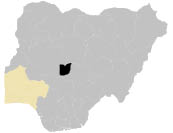Even before a memo to that effect is presented to either the Senate or the House of Representatives ad hoc committees on the review of the 1999 Constitution, the proposal for Nigeria to return to regional government has gained ground, overshadowing other items before the committees.
The 10th National Assembly is currently in the processes of reviewing the 1999 Constitution.
The Senate committee alone has received 37 fresh constitution alteration bills, in addition to the 16 inherited from the 9th Senate, bringing the number to 53.
During a recent retreat by members of the Senate ad hoc committee in Kano, the issue of regionalism came up and not only generated a heated debate but also elicited reactions across the country.
It was learnt that the matter came up when a document sent to the Presidency and copied to the leadership of both chambers of the National Assembly became public knowledge.
The memo titled: “Path and Processes Towards Restructuring Nigeria,” written by Akin Fapohunda, a retired director in the federal service is advocating for a return to regionalism as a way of fostering development in the country.
Fapohunda, when contacted by our correspondent, confirmed that he had sent a document with that title to the Presidency and copied same to the leadership of the National Assembly.
The feelings that the proposal may return to the National Assembly as an executive bill piqued the interest of stakeholders in the former regions based on their understanding and perceptions about how their areas would fare under such an arrangement.
Prior to the nation’s independence in 1960, the nation was divided into three regions: North, West and East, and in1963, an additional region, Midwest was created, making the number four in the First Republic.
The regions were, however, collapsed in 1966 by the regime of General Aguiyi Ironsi with the promulgation of Decree No. 34.
That the issue of returning the country to the old structure is resurfacing 58 years after indicates there are many who prefer the regional system.
Proponents of regionalism point at how the defunct regions harnessed the natural resources in their respective domains to build robust economies that served them well and even enabled them to contribute to the centre in a pre-oil-dependent economy.
The current structure, those in support of regionalism have argued, does not bring out the potentials of the governance units, which basically fold their arms waiting for federation allocations derived from oil sales.
Secretary of the Arewa Consultative Forum (ACF), Alhaji Murtala Aliyu traced the agitation for regionalism to the colonial era when minority ethnic groups began to demand for recognition, resulting in the establishment of the Willink Commission to address their concerns.
He said the Willink Commission highlighted this issue, and when the civil war started, 12 states were created
based on the sentiments to address the demands of minorities.
Fapohunda, whose memo generated the recent controversy, told Weekend Trust that he penned the document based on the significance of the demand on the need for sociopolitical fairness.
He said: “On a political basis, Nigeria is not one. We have been deceiving ourselves. The only way to address such imbalances is for the country to return to regions.
“If we say we have 600 tribes in Nigeria, let’s know these 600. Why are we sitting on them? Why are we saying only Wa Zo Bia? You cannot have justice when you sit on some other people. So, there is the need for us to regionalise so that there would be an expression of self-determination”, he said, adding that the current structure of Nigeria could not be sustained.
Secretary of the Igbo Elders Consultative Forum and the Ohanaeze Council of Elders in the 19 Northern States and the FCT, Professor Charles Nwekeaku, agrees that the current system is faulty because it is “unitary centralism”.
He said a system where 68 items are in the Exclusive List makes the centre and the office of the president too powerful.
While the components that make up the former Western and Eastern regions have been upbeat about return to regionalism, the North appears to be cautious about such demands.
One of our correspondents reported how the debate on return to regionalism divided senators from the North and South during a two-day retreat on the amendments to the 1999 constitution which held in Kano between Friday September 27 and Sunday 29.
When the issue came up, a ranking senator, Abdul Ningi, representing Bauchi Central Senatorial District stated pointblank that his constituents will not support the idea of return to regionalism.
He said this is because they did not enjoy development when the system was practiced in the First Republic.
The ACF said it is open to discussions on the matter but counselled that emotional demands would not solve the problems facing the nation.
National Publicity Secretary of the Afenifere loyal to Pa Fasoranti, Comrade Jare Ajayi, said the resurgence of calls for regionalism could be due to the desire of many Nigerians for the country to truly operate as a federation. “This is to accelerate the pace of development and enhance people’s participation in their own affairs,” he said.
While responding to Weekend Trust inquiry, Ajayi stated that the present system is not serving the country and its people well, adding that, “any arrangement that would make Nigeria a true federation is what Afenifere affirms”.
Prof. Nwekeaku, on his part, said the position of the Igbo is that the various sections of the country should govern themselves in a kind of confederation arrangement. “We don’t want to talk about the four regions we had in the past, but the six regions and to accommodate the minority areas.
“We want restructuring that allows every section a modicum of autonomy to organise themselves the way they deem fit, harness the resources in their zones and pay tax to the federal government”, he said.
Jibrin Ibrahim, a professor of Political Science and a member of the governing board of the Centre for Democracy and Development (CDD), however, rejected the idea of regional governments. “I don’t think it’s a very good idea because states are here to stay, and if you want to pursue regionalism, in my view, it means you are going to add an extra structure of governance over the state structure in a context where the cost of governance in Nigeria is already excessive. So, I don’t think it’s a good idea”, he said.
On switching to parliamentary system of government, he said the reality about Nigeria is that after three decades of presidential system, it is very difficult to change to the parliamentary system.
The Middle Belt Council of Elders also rejected the call for regionalism, saying it is better to advocate for true federalism, including creation of new states and the implementation of the 2014 national conference (CONFAB) report.
Chairman of the council, Gen. Zamani Lekwot (rtd), in a statement, said that given the complex nature of the diverse federation, the call by some people for a return to regionalism is untenable.
“Under such a system before the coup in January 1966, the minorities were seriously marginalised by the major ethnic groups”, he said.
Some also fear that the demand for regionalism might give verve to those agitating for the balkanisation of the country, and that people would be more devoted to their regions, rather than what is for the common good of all Nigerians.
Our correspondents observed, however, that the key proponents of regionalism are not asking for the pre-independence or 1st Republic model of the governance system.
Unlike that period where there were only four regions, those demanding a return to regionalism want the current six geopolitical zones to serve as the federating units.
A former Commissioner for Works in Kano State, Engr. Mu’azu Magaji, is proposing the adoption of what he calls ‘development federalism’ with six regional economic development hubs as part of his intervention in the ongoing debate on restructuring and reforming the Nigerian federation.
Meanwhile, both proponents and opponents of the system admit that there are challenges in the adoption of the idea.
Secretary of the ACF said the challenge is that there would be no limit to such agitations if granted since they are instigated by minority rights concerns. “For example, in my state, Gombe, the smallest in the North, we have 11 local governments and 23 distinct ethnic groups. If each group seeks its own micro-nation, it complicates matters.
“In Benue State, for instance, the Tiv are the majority, while the Idoma and others are minorities. Creating a region for minorities raises questions about what that really entails. The push for a separate region seems more emotional than practical,” he stated.
Due to the challenges some have suggested that instead of going back to full-fledged regional governments, local governments should be granted full autonomy while a federal structure is retained, making the six geopolitical zones as economic development hubs.
Said Magaji: “My view is that we have the six regions and Abuja and instead of going back to full-fledged regional governments. My belief is that we should retain the Federation, give autonomy to local governments; and the federal government as it is should be focused on making the six regions and Abuja development hubs. It should be coordinating the state governors to form a very strong alliance”.
Magaji said the model should be tried for a period of 25 years before contemplating return to parliamentary system or regionalism.
Whether the proposals would resurface at the National Assembly or not, events have shown clearly that there’s a nostalgic pull towards the regional government due to what many perceive as its advantages over the current system.
Contribution from Datti Ahmed

 Join Daily Trust WhatsApp Community For Quick Access To News and Happenings Around You.
Join Daily Trust WhatsApp Community For Quick Access To News and Happenings Around You.


